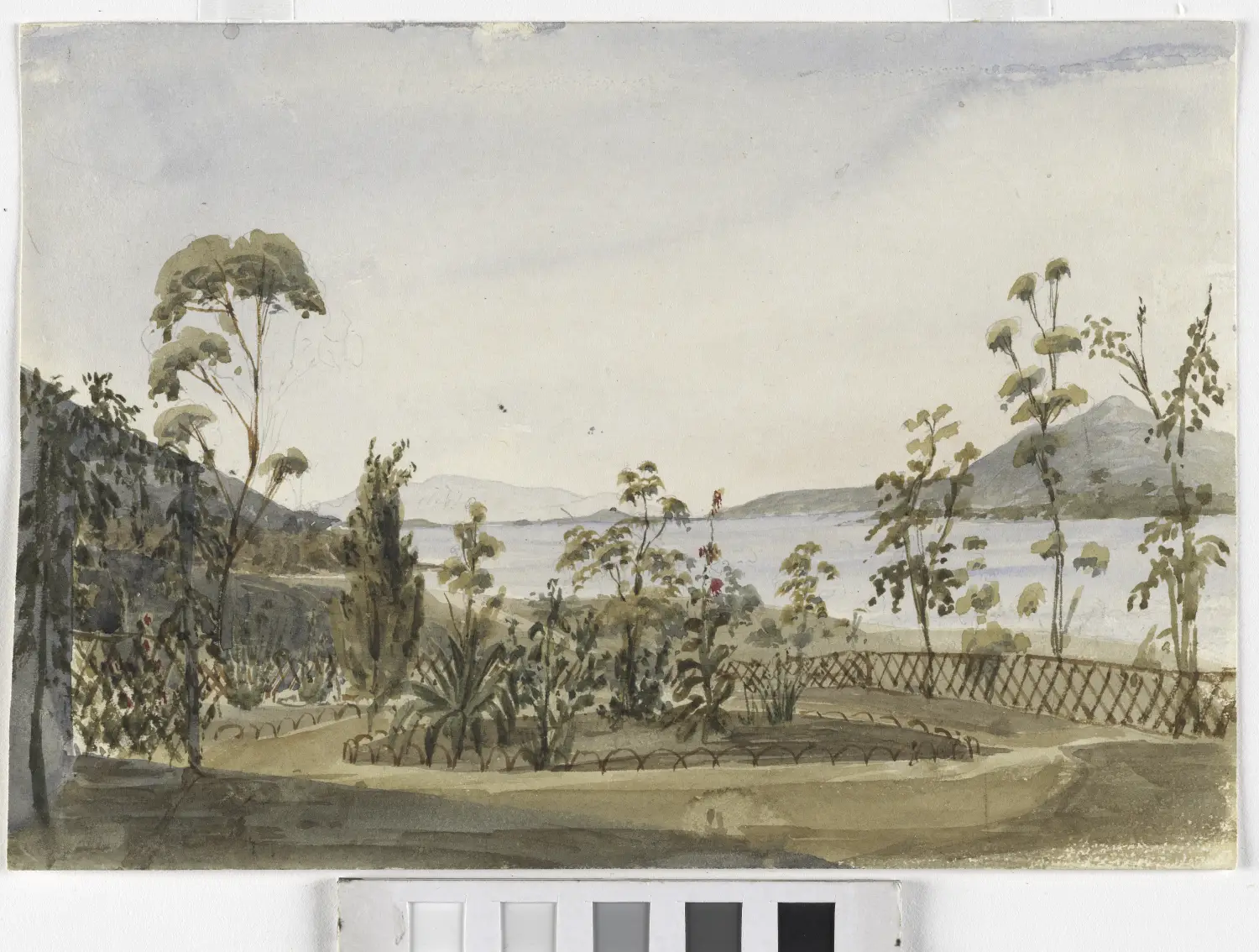The RST Council recently awarded the MR Banks Medal for this year to Associate Professor Jacqueline Halpin.

RST Apology to Tasmanian Aboriginal people 2021.

RST Apology to Tasmanian Aboriginal people 2021.

The RST Council recently awarded the MR Banks Medal for this year to Associate Professor Jacqueline Halpin.
Who do you trust when it comes to climate change? 6 November 2025 In September at the UN General Assembly, President Donald Trump called climate change “the greatest con job ever perpetrated on the world”. Instead, as climate change intensifies and bushfires become more frequent and destructive, the Royal Society of Tasmania (RST) invited members […]
5 November 2025 The Royal Society of Tasmania (RST) is proud to announce its successful application for a 2025 Community Heritage Grant, securing $8,120 in funding to conserve three significant works from its renowned Art Collection. The annual Community Heritage Grants are managed by the National Library of Australia and provide funding of up to […]
Nominations for the RST Annual Doctoral (PhD) Awards open on 1 October 2025. Two awards are offered for recent PhD graduates who have made significant advances in the course of their doctoral research. The value of each award is $1,000 (AUD).
The Royal Society of Tasmania made a significant impact at the recent Oatlands Heritage and Bullock Festival, presenting their Hidden Treasures exhibition in two of the town’s most historic venues. The Court House and Gaol House were transformed into temporary galleries, displaying high-quality digital prints from the Society’s extensive Art Collection. Strong Community Response The […]
A selection of The Royal Society of Tasmania’s remarkable collection of historical maps is now available as high-quality reproductions in our online shop. These museum-grade prints bring centuries of Tasmanian exploration and discovery directly to your walls. Museum-Quality Printing Standards Each map reproduction is created from high-resolution scans of original maps in our collection. The maps […]
In former years when the Governor by convention served as RST President, Sir Guy Green AC, KBE, CVO was President and Patron of the Royal Society of Tasmania from 1995 to 2002, while serving as the Governor of Tasmania. He was always generous with his time and was happy to meet with the members of the RST […]
Congratulations to the 2025 Georgina Sweet Australian Laureate Fellow, Professor Anya Reading The premier funding body for University research excellence in Australia is the Australian Research Council (ARC) and the most prestigious ARC awards are the Laureate Fellowships. These five-year fellowships are reserved for internationally top-tier researchers, and one, named the Georgina Sweet Australian Laureate […]
Congratulations to Australian Laureate Fellow, Professor Matt King The premier funding body for University research excellence in Australia is the Australian Research Council (ARC) and the highest ARC awards are the Laureate Fellowships. These five-year fellowships are reserved for internationally top-tier researchers, only 17 being awarded annually. Among the 2025 awardees is Professor Matt King, […]
The Royal Society of Tasmania warmly congratulates Mary Koolhof on receiving the Medal of the Order of Australia (OAM) in the 2025 King’s Birthday Honours for her service to education and the community. A longstanding member, councillor, and former president of the Society, Mary Koolhof has made outstanding contributions to learning, inclusion, and community engagement. […]
The RST will offer three medals in 2025: The Royal Society of Tasmania Medal, the Clive Lord Medal and the MR Banks Medal.
Listed here are the 2024 medal winners for the Peter Smith Medal and the Louisa Anne Meredith Medal. A medals ceremony will be held at Government House on 18th June, 2025 where the medal winners will be presented with their medals by Her Excellency the Honourable Barbara Baker AC. This ceremony is open to everyone. […]
The RST Council recently approved the two winners of the 2024 Doctoral (PhD) Award. This award is intended to recognise recent PhD graduates who have made significant advances during their doctoral research. The value of the award is $1,000 (AUD). The winners of the 2024 RST Doctoral (PhD) Award were Dr Ingrid Cox and Dr […]
Tasmania Reads is a week-long celebration of reading and storytelling of all kinds. In March 2025 the RST hosted a popular and much-enjoyed talk by Tasmanian crime fiction writer David Owen. Many attendees knew David from his time as Official Secretary to three Tasmanian Governors at Government House. In 2021 he co-authored with Prof Kate […]
It is with great sadness we acknowledge the death of Distinguished Professor James Kirkpatrick AM on 21 October 2024. Professor Kirkpatrick was one of our most prestigious members and a significant contributor to the Royal Society. In 2019 he was awarded the Clive Lord Medal in recognition of his research on Tasmania’s natural environment, including […]
Professor David Green died on 6 September 2024 in Hobart. He was a long-term member of the RST and was awarded the RM Johnston Memorial Medal in 2016. Professor Green’s career in geology (igneous petrology) was truly remarkable for the breadth and significance of his research and achievements, especially his contributions to understanding the formation […]
Congratulations to our RST member Lynne Uptin OAM who was awarded the 2024 Best Botanical Art Exhibit Award and a Gold Medal award for 2024 for her suite of works. The Royal Horticultural Society (RHS) in London is staging its annual Botanical Art and Photography Show from 14 June to 7 July 2024. The exhibition […]
Article prepared by the RST Honorary Curator, Dr Anita Hansen, for the August 2023 RST Newsletter. George Thomas William Blamey Boyes – a member of the John Skinner Prout cohort who painted ‘plein air’ watercolours is this month’s protagonist, and he is arguably as well-known as a diarist as an artist. As well as having […]
Article prepared by the RST Honorary Curator, Dr Anita Hansen, for the April-May 2023 RST Newsletter. I thought that I would write about something quite different for this month’s newsletter. That is, artworks that are not by a Tasmanian artist or of a Tasmanian scene or person. There has been some debate as to whether […]
Article prepared by the RST Honorary Curator, Dr Anita Hansen, for the April-May 2023 RST Newsletter. The Amateur Tradition: Documenting Place Charles Henry Theodore Costantini, Paris-born surgeon was transported to Australia twice. After some time in New South Wales, he was given a pardon and returned to England. Shortly after returning, he was found guilty […]
Article prepared by the RST Honorary Curator, Dr Anita Hansen, for the December 2022 RST Newsletter This month’s article is the second piece about John Skinner Prout’s Tasmania Illustrated, Vol 1. (the remaining lithographs). John Skinner Prout (1805–1876) Last month I looked at five lithographs and covers from John Skinner Prout’s Tasmania Illustrated, Vol 1, […]
Article prepared by the RST Honorary Curator, Dr Anita Hansen, for the November 2022 RST Newsletter This month’s article will be the first piece about John Skinner Prout’s Tasmania Illustrated, Vol 1. (the first five lithographs). The next exciting instalment will be in December’s Newsletter!: John Skinner Prout (1805–1876) In January 1844 Van Diemen’s Land […]
Article prepared by the RST Honorary Curator, Dr Anita Hansen, for the October 2022 RST Newsletter Because Van Diemen’s Land began as a penal colony, it is not surprising that a number of our early artists were convicts – unfortunately occasionally putting their artistic talents to forgery. One of the convict artists featured in the […]
Article prepared by the RST Honorary Curator, Dr Anita Hansen, for the September 2022 RST Newsletter This month I will look at the work of another naval officer, Captain James Lucas. There is no record of how the eight watercolours by James Lucas came to be in the Royal Society of Tasmania Art Collection. It […]
Article prepared by the RST Honorary Curator, Dr Anita Hansen, for the August 2022 RST Newsletter The Royal Society of Tasmania Art Collection includes three pieces by the artist and lithographer Frank Dunnett. Those of you who were at the Society’s Mid-Winter Lecture on 14 July will recall that Marley Large and I spoke briefly […]
Article prepared by the RST Honorary Curator, Dr Anita Hansen, for the July 2022 RST Newsletter. Louisa Anne Meredith was quite a remarkable woman; a prolific artist, writer and social commentator. The Society has a large number of her sketches and watercolours in its Art Collection, as well as a number of her books in […]
Article prepared by the RST Honorary Curator, Dr Anita Hansen, for the June 2022 RST Newsletter. William Arthur Wiggins (19 May 1881–1 January 1947) There are two artworks in the RST Art Collection that are jointly owned by the Royal Society of Tasmania and the Tasmanian Museum and Art Gallery. This one, Old Mill at […]
Article prepared by the RST Honorary Curator, Dr Anita Hansen, for the May 2022 RST Newsletter. Edward La Trobe Bateman (1815?–1897) There is only one sketch by Edward La Trobe Bateman, an exquisite pencil drawing with white highlights, in the Art Collection of the Royal Society of Tasmania. There is no record of how it […]
Article prepared by the RST Honorary Curator, Dr Anita Hansen, for the April 2022 RST Newsletter. A curious note Back in 2014, when Margaret Davies and I were considering images and books for the Society’s Library at the End of the World at the Society’s library, we found a curious note in the unbound copy […]
Article prepared by the RST Honorary Curator, Dr Anita Hansen, for the March 2022 RST Newsletter.Note: Some images may be enlarged by clicking on them. Botanical drawings After all the excitement and drama of last month’s paintings, I thought we could look at some more serene – but equally beautiful – artworks this month. The […]

The Royal Society of Tasmania acknowledges, with deep respect, the traditional owners of this land, and the ongoing custodianship of the Aboriginal people of Tasmania. The Society pays respect to Elders past, present and emerging. We acknowledge that Tasmanian Aboriginal Peoples have survived severe and unjust impacts resulting from invasion and dispossession of their Country. As an institution dedicated to the advancement of knowledge, the Royal Society of Tasmania recognises Aboriginal cultural knowledge and practices and seeks to respect and honour these traditions and the deep understanding they represent.

On 15 February 2021, the Royal Society of Tasmania offered a formal Apology to the Tasmanian Aboriginal people.